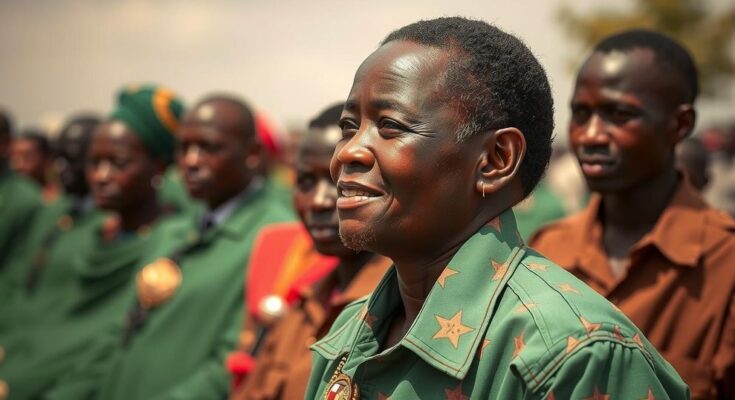The article discusses South Sudan’s postponement of elections to December 2026, raising concerns about the nation’s transition to democracy. It highlights the structural problems from its independence in 2011, the concentration of power among elite groups, and the need for an inward-focused dialogue to construct a new social contract based on citizenship rather than ethnic identity. A national conference is proposed as a means to draft a new constitution and create a more inclusive governance framework.
On September 18, 2024, the transitional government of South Sudan announced the postponement of elections until December 2026, highlighting the nation’s struggle to meet the necessary legal, financial, and technical prerequisites for credible electoral processes. This indefinite delay brings forth critical questions regarding South Sudan’s potential for a successful transition to democracy and the requisite pathways to attain this governance model.
The challenges facing South Sudan can largely be traced back to its emergence as an independent state in 2011, where unresolved structural issues plagued its formation. The independence did not successfully establish the necessary foundations for the South Sudanese populace to cultivate robust institutions essential for a functioning state. The post-independence leadership has perpetuated favoritism towards select ethnic groups, concentrating power significantly in the president’s office, thus exacerbating societal divisions and marginalizing local voices. This power centralization has stifled civic engagement, effectively reducing the nation’s capacity to function cohesively while reinforcing pre-existing ethnic tensions.
In addition to internal governance issues, the international community has inadvertently played a role in amplifying the crisis. Often perceiving South Sudan predominantly as a humanitarian challenge requiring aid, elections, and conflict mitigation strategies, the international narrative fails to recognize the potential for trade, investment, and socioeconomic growth within the nation.
The civil unrest, which has been ongoing since 2013, can be traced to two peace agreements signed in 2015 and 2018, which, while internationally endorsed, have not addressed systemic problems. Rather than facilitating inclusive governance, these arrangements have safeguarded the interests of unelected political figures while leaving the ordinary populace without the necessary democratic infrastructure. Elections alone are insufficient to remedy the entrenched issues; what South Sudan requires is a paradigm shift towards a new independence that emphasizes building political stability, economic resilience, and effective security institutions.
As South Sudan struggles with internal conflict, a vital step towards democracy involves fostering an internal dialogue among its citizens. This introspective engagement is essential for recognizing the nation’s failures and discussing how to construct a new social compact that addresses stability and development. It is crucial for South Sudanese to collectively identify the core issues at hand. Currently, consensus on the state’s existential challenges remains elusive, with the pressing question being how to disentangle ethnic affiliations from the national identity. Emphasizing citizenship over ethnic identity is a primary requirement for forging a viable democratic framework.
The nation’s current discourse surrounding its future is chaotic. Many marginalized communities, faced with the absence of a credible political platform, resort to violent struggles for representation. This situation necessitates a national conference, uniting various political, civic, and religious groups to construct a comprehensive democratic strategy. This assembly must embody South Sudan’s diverse character, ensuring inclusivity, with substantial delegations from women and youth. The ultimate goal would be to formulate a new constitution that supplants the existing exclusionary framework hastily set before independence.
To realize genuine democratic governance, South Sudan requires a solution cultivated from within. Moving away from ineffective agreements and election-based strategies, the nation needs a South Sudanese-led dialogue culminating in a national conference to empower its citizens and foster a resilient socio-political landscape. Through such initiatives, South Sudan can reinvent itself and pivot towards stability and development not only for itself but also for the greater Horn of Africa.
The article addresses the ongoing political crises in South Sudan, a nation that has struggled with governance, identity, and internal conflict since its independence in 2011. The discussion is framed around the recent postponement of elections, which highlights deeper systemic issues related to governance and ethnic tensions. The author advocates for a thorough, citizen-led engagement to rectify these issues and establish a democratic framework in the country.
In conclusion, South Sudan stands at a pivotal moment in its quest for democracy. The country requires more than surface-level electoral processes; it necessitates a comprehensive reassessment of its governance structures and an inclusive dialogue among its citizens. By recognizing ethnic identities’ impact on nationhood and centering citizenship in their political discourse, the people of South Sudan can forge a path toward stability and genuine democratic representation. Such concerted efforts will not only revitalize South Sudan’s internal governance but also contribute positively to the broader regional stability.
Original Source: www.radiotamazuj.org




